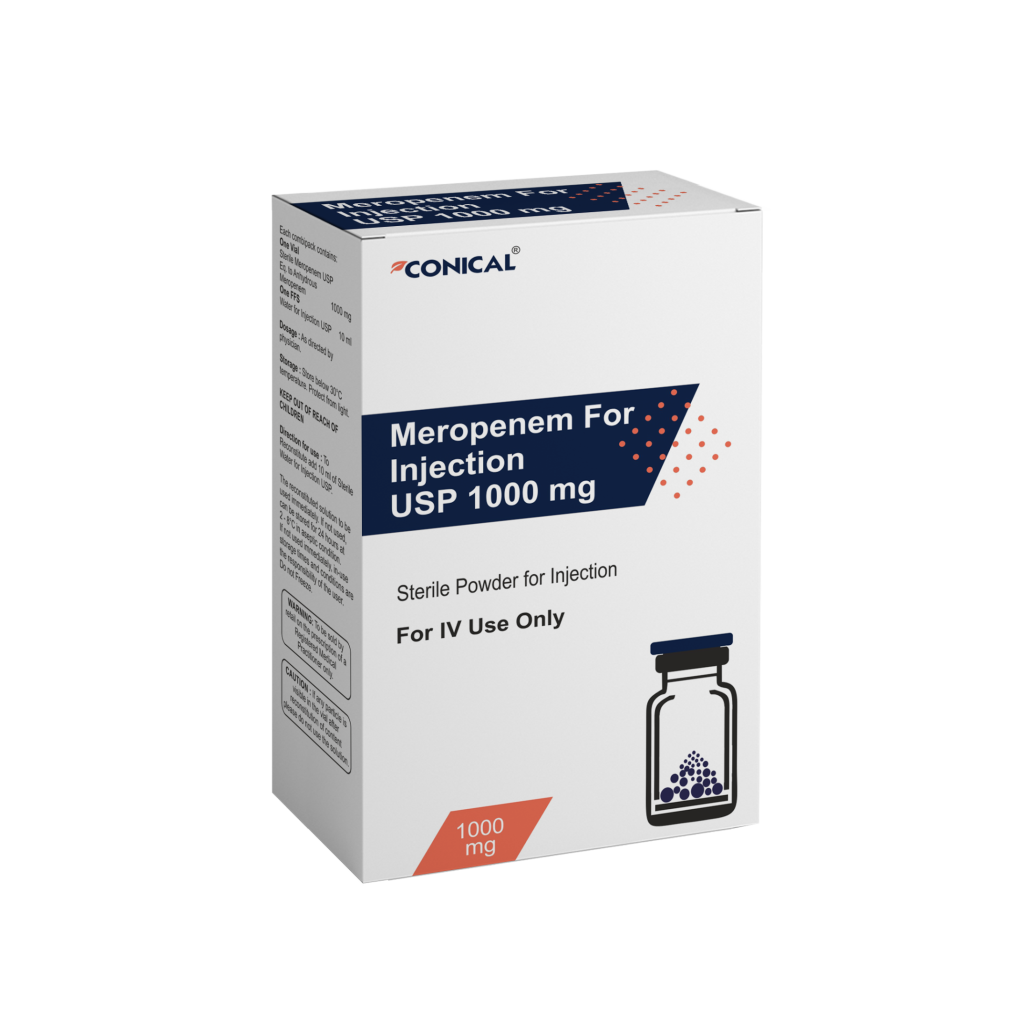Meropenem Injection 1000 mg
- Meropenem For Injection USP 1000 mg
Therapeutic Class: Anti-Infectives
Dosage Forms: Injectables
Brand Name: Meropenem Injection™

How it works?
Uses of Meropenem Injection 1000 mg
Meropenem Trihydrate for Injection USP 1000 mg is indicated for the treatment of the following infections in adults and children aged 3 months and older:
Severe pneumonia, including community-acquired pneumonia and nosocomial pneumonia
Broncho-pulmonary infections in cystic fibrosis
Complicated urinary tract infections
Complicated intra-abdominal infections
Intra- and post-partum infections
Complicated skin and soft tissue infections
Acute bacterial meningitis
Meropenem may be used in the management of neutropenic patients with fever that is suspected to be due to a bacterial infection
Meropenem may be used in the treatment of patients with bacteremia that occurs in association with, or is suspected to be associated with, any of the infections listed above.
Consideration should be given to official guidance on the appropriate use of antibacterial agents.
Precautions of Meropenem Injection 1000 mg
The selection of meropenem to treat an individual patient should take into account the appropriateness of using a carbapenem antibacterial agent based on factors such as severity of the infection, the prevalence of resistance to other suitable antibacterial agents and the risk of selecting for carbapenem-resistant bacteria.
Enterobacteriaceae, Pseudomonas aeruginosa and Acinetobacter spp. resistance
Resistance to penems of Enterobacteriaceae, Pseudomonas aeruginosa, Acinetobacter spp.
Prescribers are advised to take into account the local prevalence of resistance in these bacteria to penems.
Hypersensitivity reactions
As with all beta-lactam antibiotics, serious and occasionally fatal hypersensitivity reactions have been reported. Patients who have a history of hypersensitivity to carbapenems, penicillins or other beta-lactam antibiotics may also be hypersensitive to meropenem. Before initiating therapy with meropenem, careful inquiry should be made concerning previous hypersensitivity reactions to beta-lactam antibiotics. If a severe allergic reaction occurs, the medicinal product should be discontinued and appropriate measures taken.
Antibiotic-associated colitis
Antibiotic-associated colitis and pseudomembranous colitis have been reported with nearly all anti-bacterial agents, including meropenem, and may range in severity from mild to life threatening. Therefore, it is important to consider this diagnosis in patients who present with diarrhoea during or subsequent to the administration of meropenem. Discontinuation of therapy with meropenem and the administration of specific treatment for Clostridium difficile should be considered. Medicinal products that inhibit peristalsis should not be given.
Seizures
Seizures have infrequently been reported during treatment with carbapenems, including meropenem.
Hepatic function monitoring
Hepatic function should be closely monitored during treatment with meropenem due to the risk of hepatic toxicity (hepatic dysfunction with cholestasis and cytolysis). Use in patients with liver disease: patients with pre-existing liver disorders should have liver function monitored during treatment with meropenem. There is no dose adjustment necessary.
Direct antiglobulin test (Coombs test) seroconversion
A positive direct or indirect Coombs test may develop during treatment with meropenem.
Concomitant use with valproic acid/sodium valproate/valpromide
The concomitant use of meropenem and valproic acid/sodium valproate/valpromide is not recommended.
This medicinal product contains 90.2 mg of sodium per 1.0 g dose which should be taken into consideration by patients on a controlled sodium diet.
Dosages administration of Meropenem Injection 1000 mg
The dose of meropenem administered and the duration of treatment should take into account the type of infection to be treated, including its severity, and the clinical response.
A dose of up to 2 g three times daily in adults and adolescents and a dose of up to 40 mg/kg three times daily in children may be particularly appropriate when treating some types of infections, such as infections due to less susceptible bacterial species (e.g. Enterobacteriaceae, Pseudomonas aeruginosa, Acinetobacter spp.), or very severe infections.
Side effects of Meropenem Injection 1000 mg
thrombocythaemia, Uncommon: eosinophilia, thrombocytopenia, leucopenia, neutropenia, agranulocytosis, haemolytic anaemia, headache, diarrhoea, vomiting, nausea, abdominal pain, transaminases increased, blood alkaline phosphatase increased, blood lactate dehydrogenase increased, rash, pruritis, Uncommon: urticaria, toxic epidermal necrolysis, Stevens Johnson syndrome, erythema multiforme, Not known: Drug Reactions with Eosinophilia and Systemic Symptoms (DRESS Syndrome), inflammation, pain.
Storage instruction of Meropenem Injection 1000 mg
Store below in cool and dry place. Protect from light.
Keep the medicine out of reach of children.
Packing details of Meropenem Injection 1000 mg
Meropenem Trihydrate For Injection USP 1000 mg is filled in 20ml USP typr I Amber tubular glass Vial, sealed with bromo butyl rubber stopper and white coloured Aluminium flip off and white coloured Aluminium flip off seal.
interested? let’s talk.
Contact us directly to receive full information on the product, the formulation, the science behind it, stability data, and more. Our Business Development Manager is a click away.
Frequently Asked Questions
Questions are useful tools, they open lines of communication; give us information; improve interactions, facilitate analysis, and many more.
